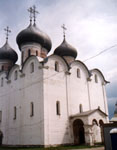 Vologda city (1989 pop. 283,000), North central European Russia, on the Vologda River. Vologda city (1989 pop. 283,000), North central European Russia, on the Vologda River.
In opinion of experts for today Vologda is one of the most surviving ancient cities of the country and national property of Russian people. Safety of Vologda gives Vologda cty the status of historical city of federal value. It is included into 116 Russian cities having especially valuable historical heritage and in 42 cities of Russia which architectural shape is taken under the special control of federal authorities.
Vologda - the known centre of lace. By 1893 4 thousand masters, in 1912 - 40 thousand were engaged in a lacy craft. In 1930 the Vologda union of lace-makers is created. The Vologda laces are marked by a gold medal at the exhibition in Paris in 1937, a gold m edal in Brussels in 1958. edal in Brussels in 1958.
It is a major river and rail junction in a dairying region. There are railroad repair yards, machine factories, lumber mills, and flax-processing plants. Vologda is famed for its lace. Founded in 1147 by merchants from Novgorod, it passed to Moscow in the 15th cent. and was from the 15th to 17th cent. a major trade center and transit point to North-Eeast Russia, Siberia, and West Europe. It declined in the 18th century, but revived in the late 19th cent. with the development of the lumber industry and the coming of the railroad. In Vologda's old kremlin are the 18th-century bishop's palace and the Cathedral of St. Sophia, built (1568-70) by Ivan IV. The Spasso-Priluki monastery (founded 1371) is nearby.
Ensembles of monuments Spasso-Prilutsky monastery, Vologda Kremlin are widely known. A symbol of city became the Sofia Cathedral with its huge belfry, well-known by legends and of striking of ancient chimes. its huge belfry, well-known by legends and of striking of ancient chimes.
The territory of the Vologda oblast includes 28 municipal educations.
Cities of regional submission: Vologda, Great Ustyug, Falcon, Cherepovets.
Settlements of regional value (administrative centres) - 24.
|













 State
State  Cities
Cities